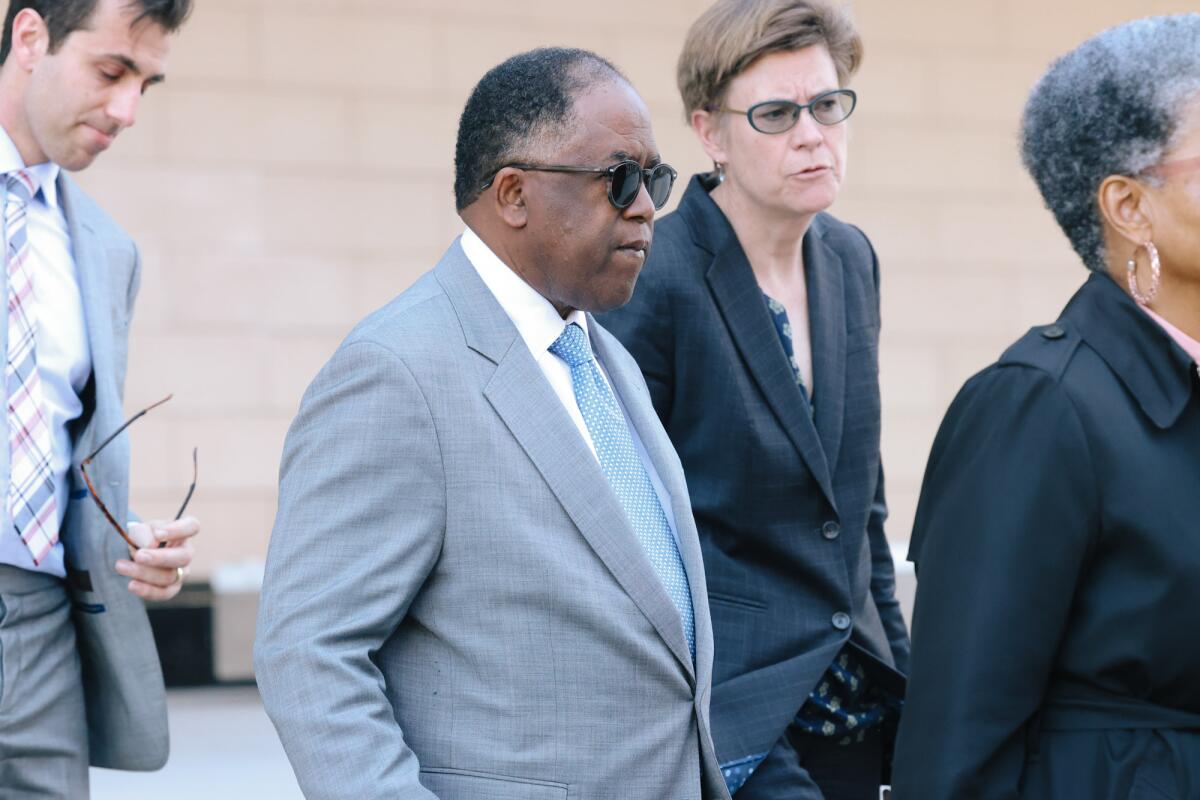Prosecutors seek 6-year prison term for Ridley-Thomas: ‘This was a shakedown’

Prosecutors asked a federal judge Monday to sentence veteran Los Angeles politician Mark Ridley-Thomas to six years in federal prison, citing the menace of public corruption in a democracy and the lawmaker’s exploitation of the power and privileges of his office.
In a stinging memo, prosecutors summarized Ridley-Thomas’ conduct in blunt terms as a “shakedown” in which he “made his self-interested demands known” to a USC dean and sought favors from the university for his son in exchange for county business. At the time, he was one of five members of L.A. County’s powerful Board of Supervisors.
“Defendant is highly educated, richly supported, and politically connected. He was uniquely positioned to serve his constituents. Instead, he served himself,” prosecutors wrote in a 32-page memo.
“Through his own corrupt actions, abuse of his powerful elected office, failure to accept responsibility, and efforts to undermine the public’s faith in this judicial process, defendant’s overall conduct strongly supports a sentence of 72 months’ imprisonment.”
Late Monday, defense attorneys filed their own sentencing papers, asking the judge for a range of 21 to 27 months, then seeking a downward variance that features no time in prison and, instead, a period of probation with home confinement, community service and a monetary penalty.
“There is no need to incarcerate Dr. Ridley-Thomas to protect the community,” his lawyers wrote. “The shame of his convictions is punishment and provides ample specific deterrence.”
U.S. District Judge Dale Fischer is scheduled to hand down her sentence Aug. 21.
Ridley-Thomas’ request for a probation term of less than 21 months is striking, considering his co-conspirator, former USC dean Marilyn Flynn, received a three-year probation sentence earlier this summer. At that proceeding, Fischer remarked of Flynn, “I seriously considered imprisonment.”
Flynn pleaded guilty to one count of bribery in 2022. Ridley-Thomas, by contrast, was convicted by a jury in March of four counts of honest services wire fraud and one count each of bribery, conspiracy and honest services mail fraud.
Jurors acquitted him of 12 other fraud charges related to a scholarship and job his son received from USC around the time the politician was voting on other matters sought by the university.
In their sentencing memo, Ridley-Thomas’ defense attorneys repeated some points from trial, emphasizing that their client received no financial benefit.
“The county motion he supported would have passed regardless; it was non-controversial and every supervisor voted for it,” his lawyers wrote.
Much of Ridley-Thomas’ sentencing papers quoted from some of the 130 or so letters of support written to the judge, including from Aileen Adams, chair of the Weingart Foundation; retired lawmaker Sheila Kuehl; and Ridley-Thomas’ wife and daughter-in-law.
The identities of those who submitted letters supporting Ridley-Thomas are unclear. His defense attorneys filed the letters under seal Monday but told The Times that redacted versions would be available later in the week.
Supporters and defense attorneys spoke glowingly of Ridley-Thomas’ political record and framed the jury’s guilty convictions around the community impact.
“Whatever the Court decides, Los Angeles has lost one of its most effective public servants ever; Dr. Ridley-Thomas will never hold office again,” his lawyers wrote.
Seemingly anticipating this argument, prosecutors criticized Ridley-Thomas as leaning “into a flattering (yet false) narrative that he always acted in ‘good faith,’ never for himself or his son, and consistently for the good of the community — the community he defrauded.”
Prosecutors also lambasted Ridley-Thomas for allowing a “public narrative” in which “community groups and media personalities with ties to [him] encourage the public to discount the verdict.”
“Defendant is not a victim,” prosecutors wrote. “He was not targeted by the federal government or USC. He is not a casualty of false testimony. And his trial was not unfair.”
More to Read
Sign up for Essential California
The most important California stories and recommendations in your inbox every morning.
You may occasionally receive promotional content from the Los Angeles Times.











